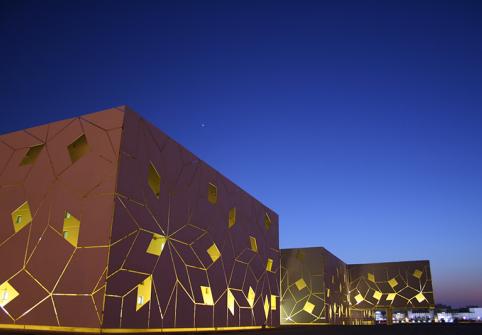News
HBKU Faculty to Develop Li-Fi Supporting Technology
05 Apr 2018
Faculty members at Hamad Bin Khalifa University’s (HBKU) College of Science and Engineering (CSE) are conducting innovative research to create a prototype in support of Li-Fi technology – a scientific breakthrough that utilizes the abundance of light to transmit data between different devices.
Currently under development, Li-Fi technology serves similar purposes to the popular Wi-Fi technology, but works by converting light intensity into binary bits that are transmitted at high-speed rates and can be understood by electronic devices, including mobile phone cameras.
Although Li-Fi technology is considered by many to be secure with minimal possibilities of disruption, CSE’s faculty are working towards a prototype that ensures continuity and security of data communication. Their research project, titled Relay-assisted Visible Light Communication, has been made possible through a Qatar Foundation research grant.
CSE’s proposed prototype will use multiple nodes such that, if one point of reception is blocked, light may be automatically rerouted to another node, thereby ensuring constant and direct transmission at all times.
Dr. Mounir Hamdi, dean of CSE, said, “Our mandate at CSE is to work on forward-thinking solutions that are oriented towards our needs in the not-too-distant future. The support we get within HBKU and from Qatar Foundation is paramount to our success in developing applications that are relevant nationally and meet pressing challenges.”
The applications of Li-Fi are vast and extend to effective and remote traffic management, where the technology may be utilized to facilitate a ‘wireless conversation’ between two vehicles with the aim of preventing collisions. Li-Fi technology also is considered to be integral to the operation of smart homes and cities. In hospitals, Li-Fi technology becomes especially critical where the lives of patients may be contingent on seamless transmission of data. Lastly, the technology may be utilized to monitor underwater systems and examine gas pipes for any potential leaks, thereby evading catastrophic consequences.
Dr. Mohamed Abdallah, lead principal investigator of the research project, said, “Tapping into new areas of research is an overarching aim for us at CSE. All of the research we conduct today is geared towards finding real solutions with every-day applicability.”
Over the course of one year, Dr. Abdallah will be working closely with researchers at Texas A&M University at Qatar, as well as TUBITAK and Ozuegin University in Turkey, to submit the prototype for consideration. If successful, the project will move to the start-up phase.
Jaber Al Khori, a second-year PhD student who is working alongside Dr. Abdallah and Dr. Hamdi on this research, said, “My research focuses on the integration of Wi-Fi and Li-Fi technology to form a hybrid system where both technologies may operate. By doing so, we can off load the traffic from the congested Wi-Fi network to Li-Fi and make use of the tangible benefits of the free licensing visible light spectrum and high-speed data transmission. Our current focus is on security as it is a main concern with any new technology. We are working on designing a model where data can be transmitted to the ligament user without it being affected by external factors.”
HBKU’s CSE offers multidisciplinary programs across a wide spectrum of fields and specialties. All of the college’s programs focus on areas that have been identified as vital for national, regional, and international prosperity. Thirteen academic degrees are currently being offered under the college’s three divisions, which are Life Sciences, Information and Computing Technology, and Sustainable Development.
CSE also works closely with national and international partners to drive groundbreaking research and benefit from mutual resources and expertise.
To stay up-to-date on CSE’s latest research projects, events, and initiatives, visit www.hbku.edu.qa/cse
